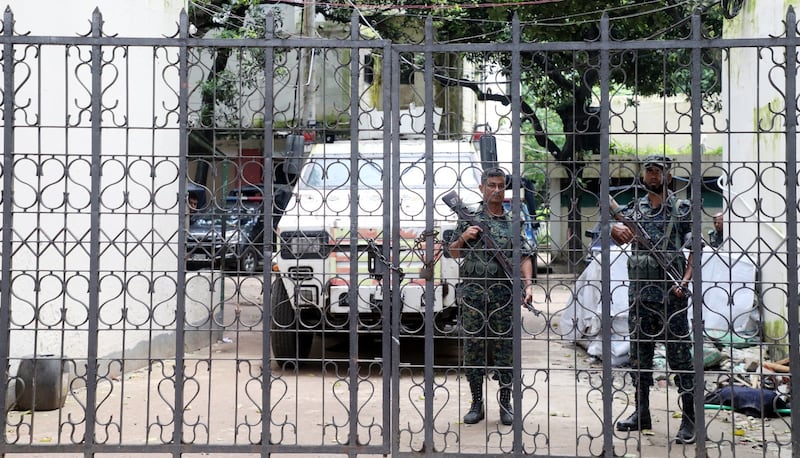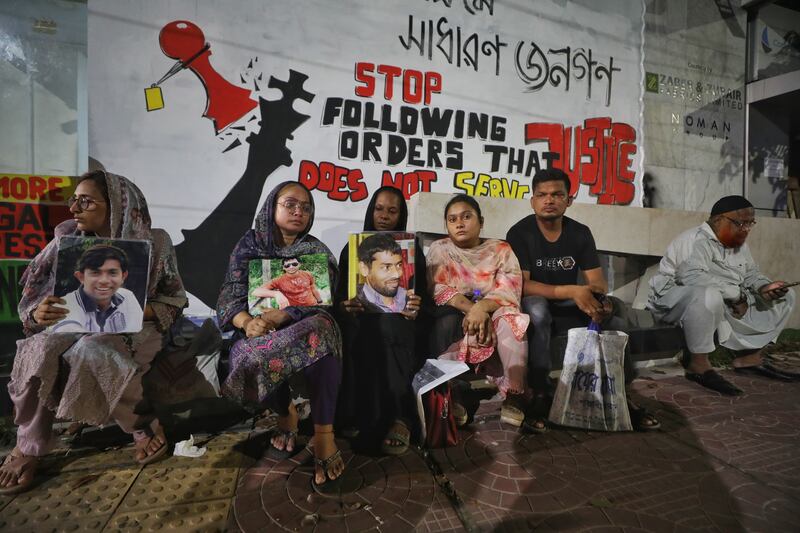Bangladesh’s interim government will be formed and sworn in on Thursday evening, and its leader Muhammad Yunus will guide citizens through a “democratic process,” the country’s Army chief announced.
There was a flurry of activity on Wednesday, two days after the resignation of Sheikh Hasina as prime minister amid a mass movement blaming her for the more than 300 lives lost during protests since mid-July.
The home ministry announced a new chief of the controversial elite Rapid Action Battalion (RAB), a day after the chief of police was replaced. The country’s attorney general resigned. Central bank employees agitated against its allegedly corrupt governors. An appeals court made a significant acquittal.
And Yunus spoke publicly for the first time since he was named a day earlier to head the interim government, mainly calling for an end to fresh violence since Hasina fled to India.
“I congratulate the brave students who took the lead in making our Second Victory Day possible and to the people for giving your total support to them,” he said in a statement.
Citizens consider Dec. 16, 1971, Victory Day to mark the official surrender by the Pakistani army during Bangladesh’s war for independence.
“Let us not let this slip away because of our mistakes. I fervently appeal to everybody to stay calm. Please refrain from all kinds of violence. … This is our beautiful country with lots of exciting possibilities,” Yunus appealed.
“Violence is our enemy. Please don’t create more enemies. Be calm and get ready to build the country.”

Gen. Waker-uz-Zaman, the Army chief, said on Wednesday that Yunus would return from Paris in time for the interim government’s members to take the oath.
“The swearing-in ceremony is expected to be held at Bangabhaban at 8 p.m. tomorrow, Thursday,” Waker told reporters. Bangabhaban is the president’s official residence.
He added that Yunus was “very eager” to begin work in the interim government.
“I am certain that he will be able to take us through a beautiful democratic process and that we will benefit from this,” Gen. Waker said.
Yunus won the 2006 Nobel Peace Prize for helping lift millions out of poverty by lending them small sums to start businesses and increase earnings.
University students who spearheaded a protest movement demanding more access to government jobs had proposed that Yunus head the interim government.
An appellate tribunal, meanwhile, cleared the decks for Yunus to assume leadership of the new administration by acquitting him in a labor laws violation case a day before the swearing-in ceremony.
He had been convicted and sentenced to six months in prison in the case, a ruling he had appealed. He was out on bail pending the verdict on the appeal, delivered Wednesday.
Yunus is stepping into the shoes of Hasina, who seemed to loathe him.
She believed he had blocked a global lending institution from financing a mega project in Bangladesh. He was subsequently barraged with a slew of legal cases that his supporters claimed were politically motivated.
‘Leadership failure’
Meanwhile, members of the police force abandoned their posts for the second consecutive day, fearing for their lives. Mobs attacked police stations after Hasina quit and decamped on Monday, when a fresh round of violence claimed at least 108 lives.
Protesters say that police and supporters of Hasina’s Awami League party were directly responsible for earlier deadly violence.
One of the first officials to be fired after Hasina fled was the country’s police chief, who was replaced on Tuesday.
Newly appointed Inspector General of Police Moinul Islam on Wednesday apologized for the police actions in recent weeks.
He said at a press conference that the “ambition” of some unprofessional members of the force led to the violent clashes.
Police officers violated human rights, “and leadership failure caused the death, injury and assault of many,” he said.

The new police chief promised an investigation and justice.
“We are committed to conducting a fair and impartial investigation into every recent killing of students, common people, and the police,” he said.
Moinul said he had instructed all members of the police force to rejoin their respective posts across the country by Thursday evening.
His predecessor, Chowdhury Abdullah Al-Mamun, was said to be partisan and a supporter of Hasina's Awami League, observers said. He used to serve in the elite police unit Rapid Action Battalion (RAB) and was one of six current or former officers the United States sanctioned in December 2021 for gross human rights violations.
The U.S. had imposed financial sanctions on RAB as well, for "undermining the rule of law and respect for human rights and fundamental freedoms, and the economic prosperity of the people of Bangladesh."
Critics said that Hasina politicized state institutions and security forces, making them agents of her ambition to stay in power and crush dissent.
Others who resigned or were fired on Wednesday included the PM’s chief secretary, the attorney general, and, according to media reports, four deputy governors of Bangladesh’s central bank.
Around 200 employees of the bank, which is called Bangladesh Bank, stormed its premises, demanding the resignation of the central bank governor, four deputy governors, advisers and the head of the financial intelligence unit, alleging they were responsible for corruption in the banking sector.
The road ahead
Analysts told BenarNews that the interim government has to depoliticize the security forces, judiciary and all state institutions, because only then can a free, fair and credible election be held.
U.S. Secretary of State Antony Blinken told reporters on Tuesday that this new administration needs to listen to the Bangladeshi people.
“[A]ny decisions that the interim government makes need to respect democratic principles, need to uphold the rule of law, need to reflect the will of the people,” he said.
The International Crisis Group, an independent organization that is committed to preventing war and conflict, on Wednesday said Bangladesh’s interim government will have the tasks of maintaining order and running the country until new national elections can be held.
“The [Bangladesh] constitution states that a general election should take place within 90 days of parliament being dissolved,” the group said in a statement on Wednesday.
“So far at least, neither Waker nor any other army officer seems eager to hold power for longer than necessary.”
The makeup of the interim government is still unknown, and may only be revealed during the oath-taking Thursday evening.
For ICG, this issue is vital to Bangladesh’s immediate future.
“The key will be to ensure that the protest movement is capably represented,” ICG’s statement said.
“If calm is to be restored, those who risked and sacrificed the most to compel Hasina to resign – namely, the students who initiated the protest movement – should have a meaningful voice in the government’s counsels, rather than find themselves sidelined by conservative generals and opportunistic politicians.”
